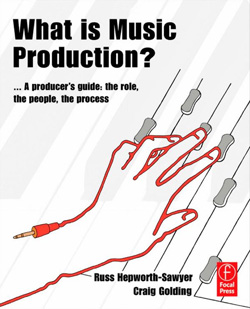
Sounding Board?
As discussed in other texts regarding music production, a producer’s role within a session does not always demand a great deal of creative (musical) input.
Much of this will depend on the artist or band you are working with, their level of musical and instrumental ability, and the quality or completeness of the songs that have been written.
This does not necessarily mean that you don’t need to be a creative person in one way, shape or form, but more that you do not necessarily have to possess top drawer musical or instrumental skills in order to run the session and successfully produce the record.
Many of the producers we have spoken to certainly advocate that musical and instrumental ability can be an advantage; however, it is not always essential.
Therefore, whether you possess a high level of practical musical skills and knowledge or not is not always an issue. So the question of what does the producer’s role become if these attributes are not required needs to be explored.
In this case the producer’s role within the session may take on a more sounding board type of role. By sounding board, we mean being the person who listens to ideas and thoughts and is then able to feed back with an objective opinion, offering suggestions, advice, and any other comments they feel might be beneficial to the process.

Of course, most producers are sounding boards at some point in the project, as the very nature of the position requires taking onboard ideas and giving opinions. However, for a producer that may not possess a great deal of practical musical skill or is working with a musically skilled artist or band, their ability to listen, digest, give opinions, and direct (i.e., be a sounding board), will be their greatest strength and asset.
Within the session the sounding board role can be vitally important in giving confidence to the artist or performer. At times a quick “yes” or “no” may be all that’s needed; at others a longer discussion to gauge an opinion might do the trick.
If we think of the world outside of music production for a moment, this role can possibly be best mapped across to that of a trusted friend. We seek their advice not to necessarily be told exactly what to do, but more to enable and assist us in making up our own minds on a given issue.
While interviewing Rupert Hine on his experiences and work within the industry, his comments referred back to a time where he found himself being asked to produce an album without really understanding why.
Rupert recalled that he was asked to produce an album by someone who had seen his name as producer on one of his own self-produced records.
When asking what it was they wanted him to do they replied, “Do the same as you did for your own album; the only difference will be that I am singing on it.” Rupert concluded by saying, “So I was never there to do a specific job, I was there to be myself.”
It is intriguing to hear similar kinds of comments from other individuals that we have interviewed, and it doesn’t take long to find a correlation in the comments contained within other books, where a guiding hand and a shoulder to lean on are cited as the producer’s main input into a session.
It seems that, despite all the other skills and expertise a producer may have, sometimes all that is required by the artist is a like-minded person who they can bounce their ideas off.
